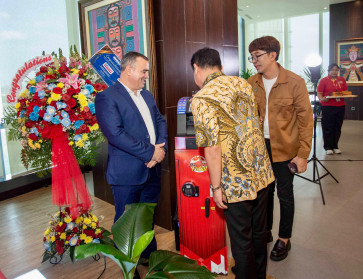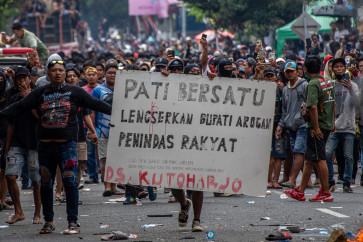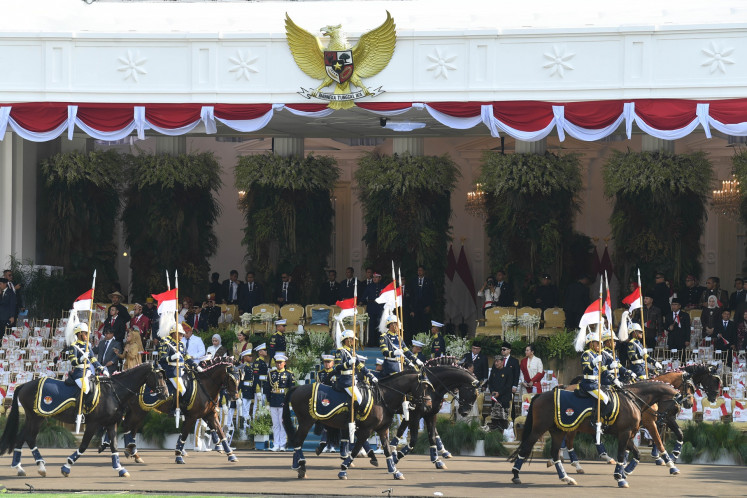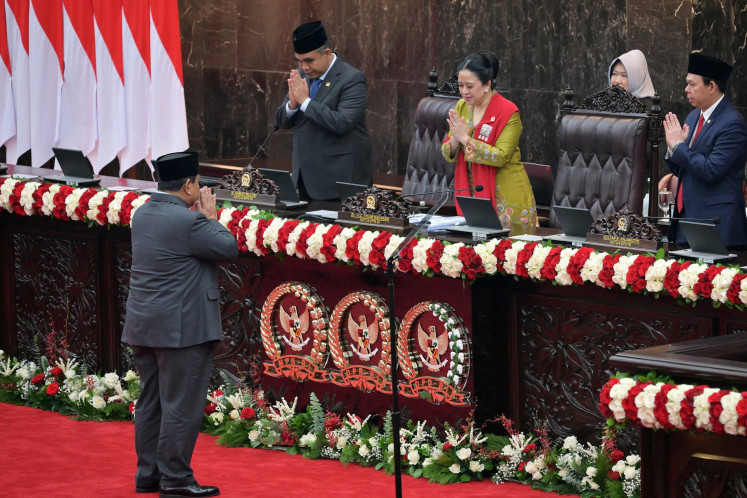Popular Reads
Top Results
Can't find what you're looking for?
View all search resultsPopular Reads
Top Results
Can't find what you're looking for?
View all search resultsFirst phase of electric bus trial ends with optimism
Test ride: People try out the new Transjakarta electric buses at the National Monument in Jakarta on Saturday
Change text size
Gift Premium Articles
to Anyone
Test ride: People try out the new Transjakarta electric buses at the National Monument in Jakarta on Saturday. (JP/Eisya A.)
Families and holidaymakers alike lined up from 8 a.m. on June 8 near the north entrance of the National Monument (Monas) in Central Jakarta to enjoy a ride on one of Transjakarta’s new electric buses before the first trial run came to an end.
The first phase of the trial run, in which the buses were operated in parks, ended on June 9, with the second phase of the trial, named the “operational trial” by Transjakarta, to commence on the city’s street with an
expanded fleet.
The buses were introduced on May 18 at Monas and have been tested at various tourist attractions over the past few weeks including Taman Mini Indonesia Indah in East Jakarta and Taman Impian Jaya Ancol in North Jakarta.
To conclude the first phase of the trial run, Transjakarta brought a bus back to Monas on Saturday for people to enjoy during the last days of the Idul Fitri holiday. The bus made loops around the monument, giving passengers the opportunity to experience the benefits of the new electric fleet.
“The bus was comfortable, neat and fast,” commented Widia, a passenger from South Tangerang, Banten, who came with her friend and their children to Monas to experience Jakarta during the holiday.
Transjakarta president director Agung Wicaksono rode the bus with a number of passengers for one loop during his visit to monitor the trial.
“Electric vehicles are the future,” said Agung. “It’s about time we change to buses powered electrically.”
The buses need to be charged for four hours in order to travel 250 kilometers, or the equivalent of 17 hours. The charging stations are solar powered.
The electric buses are different from regular Transjakarta buses as they do not produce exhaust fumes, and therefore do not pollute the air. They also move smoothly with little to no shaking, and do not create noise.
Agung said Transjakarta operated three electric buses during the first trial phase, with 10 buses to be operated during the second phase. Transjakarta and the Jakarta administration have yet to set a date for the second trial phase, in which the buses will be operated on the Senayan-Monas and Ragunan-Kuningan routes.
“Electric buses are more expensive because the technology is new, but if we consider fuel and maintenance fees, electric buses are cheaper in the long run,” said Agung.
“With the recent public protest regarding Jakarta’s polluted air, the electric bus can be a step forward in providing cleaner, better air quality,” said Agung.
As of the end of 2018, Transjakarta operated about 900 buses, which carried a total of 189.7 million people throughout last year.
In March, Transjakarta signed a memorandum of understanding with China’s electric automaker BYD Automobile, Indonesian bus manufacturer PT Mobil Anak Bangsa (MAB), Taiwan’s RAC Electric Vehicles, Danish engineering company Danfoss and the Bandung Institute of Technology to begin the trial of the electric vehicles.
Indonesia’s dependence on fossil fuels has stymied the development of infrastructure for other sources of fuel, despite policies intended to support the use of compressed natural gas (CNG). The inadequate number of CNG filling stations, for example, has meant that bajaj (three-wheeled motorized vehicle) drivers need to wait in long lines to refill their tanks.
The country has yet to develop policies to encourage the construction of recharging stations for electric vehicles. However, the central government is drafting a presidential regulation to incentivize the purchase of electric vehicles by changing the luxury goods tax calculation for vehicles so that it is based on carbon emissions rather than engine capacity. (eyc)
Intern Teddy Hans contributed to this story










